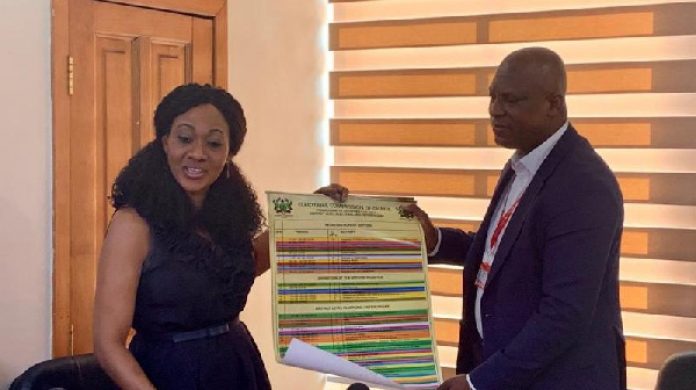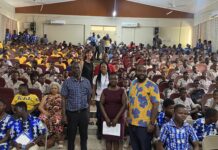Mrs Jean Mensa, the Chairperson of the Electoral Commission, says one of her focal points since assumption of office had been to work assiduously to reform the Commission by establishing good governance framework.
She said over the past years much effort had been focused on the electoral mandate while paying less attention to building the institutional systems to guide its operations.
Mrs Mensa disclosed this when she led a team of Commissioners of the EC to pay a courtesy call on the Management of the Graphic Communications Group.
Included in the team were her two deputies – Mr Samuel Tettey, in-charge of Operations, and Dr Eric Bossman Asare, in-charge of Corporate Services.
The EC’s Delegation was welcomed by Mr Benjamin Ato Afful, the Managing Director, Mrs Mavis Kitcher, Director of News, Mr K.K Inkoom, Acting Editor, and Kobby Asmah, the Political Editor.
Mrs Mensa explained that the Commission had engaged a consultant to conduct an institutional audit and make recommendations to ensure that operations were streamlined and sanity maintained to enable the Commission to deliver free, fair and transparent elections.
“The EC used to be a very grey area where anybody could take advantage of the poor system. Human Resource-wise some people have not been promoted for over 10 years so we have taken steps to make sure the carrier path is structured,” she noted.
“We did not have a scheme of service. Now we are doing a lot to motivate staff. Already people have been promoted and we have instituted a staff debar where people can air their views on critical issues.”
Touching on some of the projects that the EC had undertaken over the period, Mrs Mensa said the Commission successfully organised the referendum in December that led to the creation of the six new regions.
Thereafter, it organised the by-election in Ayawaso West Wuogon Constituency in Accra to replace the Member of Parliament who passed on.
“The elections were characterised by violence and as we continue to say it did not emanate from the activities within the polling stations.”
“We have learned many lessons including paying more attention to security, the training of EC workers and stakeholders, especially the media. This will be beneficial in the next election,” she said.
Mrs Mensa said the Commission went on to work towards the implementation of the Representation of the People’s Amendment Act (ROPAA) and, as a result, it became necessary to enhance the Report developed in 2011.
Due to challenges with the biometric voting management system the next step would be to visit countries practicing ROPAA to learn lessons to guide Ghana in her implementation of the Act.
She said the Commission introduced a monthly IPAC meeting to improve the relationship between the political parties and hold regular dialogues to develop agenda to build consensus adding that things would get better as time went on.
The political parties, per the law, had the mandate to submit a report but not all the 24 licensed political parties fulfilled that requirement.
Mrs Mensa said the Commission would work with the parties to develop a template and train them to ensure they provided a comprehensive report.











